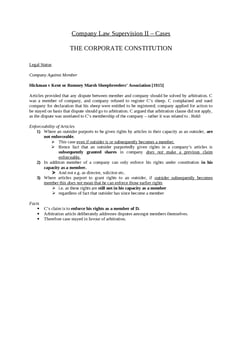Union Music v Watson [2003] 1 BCLC 453
Judgement for the case Union Music v Watson
Company with two shareholders. Claimant, the majority shareholder, and Defendant, the minority shareholder, fell out.
A prior shareholder agreement between Claimant and Defendant provided that the shareholders should exercise their voting rights so that the company could not hold any meeting or pass any resolutions unless all the shareholders were present.
Defendant threatened not to attend any meetings, and Claimant applied for court order a meeting limited to appointment of new director by Claimant (in order to provide valid quorum).
Held
-
Section 306 does not allow court to override either:
equal voting rights;
class rights
or entrenched rights
I.e. where these situations exist, will be presumed that it was intended for one shareholder to be able to block other from acting.
-
Relevant factors in exercise of power are:
Ability of company to run its affairs
Right of majority shareholder to exercise his voting power
Facts
-
Is correct to exercise discretion to order a meeting here:
-
Right in question here was simply a quorum requirement
And Defendant did not benefit from any special class rights or entrenched rights
-
Shareholdings were not equal
Thus meeting called for appointment of new director by Claimant (even though he would be only person present).
-
For Further Study on Union Music v Watson
Need instant answers? Our AI exam tutor is here to help.
Ask questions 🙋 Get answers 📔 It's simple 👁️👄👁️
Our AI is educated by the highest scoring students across all subjects and schools. Join hundreds of your peers today.
Get StartedSimilar Cases
Related Product Samples
These product samples contain the same concepts we cover in this case.

